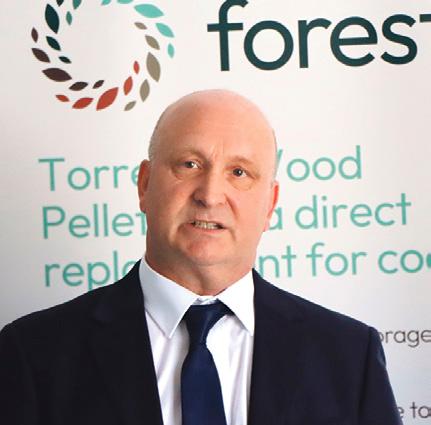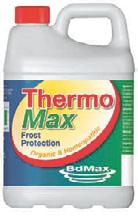

in the field




It began as a space for children to learn about growing and harvesting food but the positive impacts
Tauranga’s Teacher in the Paddock extend far beyond that for some of the Bay’s most at-risk youth.


Former primary school teacher


Kevin Powell and his horticultural guru wife, Jane, run hands-on holiday programmes, after school workshops and out of school education sessions in the hills above Welcome Bay.
“I loved teaching and seeing those lightbulb moments but there was no real-world experience. Children weren’t going out of the classroom very often. It was all technology. So, nine years ago, we decided to provide a space for classrooms to come to us.”
Teacher in the Paddock is a not-forprofit organisation that allows children to ‘muck in’ with farm chores and explore nature at their own speed. Many are seeing farm animals for the first time.


“We’ve had some children think the cow is a camel or ask ‘why isn’t it blue’ because the cow on the milk carton is blue. It’s amazing how sheltered our children are when they’re growing up in a country with so much farming.”
“The children love milking our cow, so we make butter and cheeses. We grow vegetables and the children harvest seeds,” says Jane. “We stretch out mozzarella, make sauerkraut and put it in jars.
“So, the children are going home and teaching their parents about cheese, fermentation and probiotics.”
These school holidays, Jane and Kevin will host a maximum of 15 children each day. While every child goes home with new skills, it’s the neurodiverse children who often benefit the most from their time on the farm. Small group sizes result in a more inclusive space.
“In some instances, we’ve seen a child who’s seen as the school bully completely turning that around.

“It’s so rewarding. We don’t do anything magic, we just happen to have this magic space that we can operate from,” says Kevin.
The children are encouraged to lead their own learning which is gently entwined with social skills and virtues like sharing, kindness and helpfulness.
“We get the children to pay attention to what that looks like, feels like and sounds like,” says Jane. “As they go about their daily tasks, they then recognise those traits in others. Through the food, the animals and the nature, they really find a connection to themselves.”
“It encourages a culture of support so we find that those who act out tend to want to be part of the group and sort themselves out. Some children arrive not caring how their behaviour impacts others but within a few weeks they have more consideration for others which is really something amazing,” says Kevin.
He says even something as simple as feeding chickens with piwakawaka (fantails) flitting around the field sparks pure joy in the children who’ve arrived frowning.




Bathrooms
It doesn’t matter where you are or what you’re doing, when nature calls you can’t ignore it!
TUFF Roto Moulders offers a specialty range of New Zealand Manufactured portable toilet and shower options to meet all your bathroom needs, giving you “bathrooms anytime, anywhere.” Whether it be for orchards, worksites, farms, baches, off-grid living, or additional facilities for big families – TUFF Bathroom Facilities have got you covered.




“We make portable customisable bathroom facilities, either a basic unit to connect to the house or fully self-contained units,” says Tuff Roto Moulders director, Scott McLachlan.


Manufactured in Rotorua, the team care for customers from the factory right through to the first flush. “We are able to build, deliver and assist with install of our different bathroom facilities.” No place is too far for the team either says Scott. “We have installed units from Kaitaia all the way down to Christchurch.”



Offering a range of portable shower and toilet options, including a beach, mud and sand shower, a toilet and shower combo, basic options and more. All units are durable, transportable, hygienic and easy to clean. The team also cater for personalised units too if required. “As we are the manufacturer of the bathroom facilities, we can customise our units to match anyone’s needs.”
“We are always able to discuss payment options. We can also assist with finance and WINZ quotes.”
For more information and contact details, see their advert on this page.

We have different options for toilets to suit any situation!









They’re working on a world first, manufacturing a sustainable chemical and coal replacement, and are celebrating after opening their offices in Pāpāmoa last month.
Foresta is building the first integrated manufacturing facility in Rotorua to produce rosins and terpenes from pine which can replace petroleum sourced chemicals.
The factory also is working on producing torrefied black pellets – which can be used “seamlessly” as a replacement for coal.
Foresta managing director Ray Mountfort says the plant, once opened, will use “proprietary technology” to extract natural pine chemicals, which are used in everyday products such as cosmetics, car tires and soft drinks.

“These can directly displace the need for fossil fuel based petroleum-based chemicals.
“Once the pine chemicals are removed the remaining wood is manufactured into ‘black and white’ wood pellets that can be used as a substitute for coal in commercial and industrial uses, including electricity generation.”
The plant is forecast to
generate approximately 210,000 tonnes of torrefied wood pellets and 50,000 tonnes of pine chemicals, generating an estimated NZ$290 million in total revenue per annum.

The office, which is now open in Pāpāmoa, is a step closer to making this forecast a reality.
Foresta has a Letter Of Intent to supply up to 400,000 tonnes per annum of torrefied wood pellets to Tailored Energy



Zealand, by processing these within New Zealand, we can secure more economic value and green energy.

Solutions who will use them to enable their customers to move from coal to wood-based energy.
According to the Ray, the effort is being undertaken to reduce the five per cent of greenhouse gas emissions in New Zealand made by coal consumption.
“Currently, 22 million tonnes of logs are exported from New

“Consistent supply and control over the harvesting practices are all that stands between being coal free and a sustainably managed solid energy sector.
“A key to a zero carbon New Zealand is stopping the export of logs because this is the biggest contributor of carbon emissions of our pine forest due to the shipping involved.”
The project, which has been in the works for 20 years, is in line with the Government’s commitment to transitioning the country’s economy to net zero carbon emissions by 2050.
NZ Adventures 4WD Tours have vacancies on the High Country Heritage Six Day Tour in April and November 2024. These tours are run by owners/operators Robbie and Connie Crickett, who are in their 11th year of showing people through the beautiful South Island.



The High Country Heritage is the most popular and longest established tour run by Robbie and Connie. The High Country Heritage is essentially the journey down the eastern alpine foothills from Blenheim to Cardrona. The tour includes a wide range of high country stations and conservation estate tracks along a 1250 km route through overnights in Hanmer Springs, Methven, Fairlie, Omarama and Cromwell before reaching the finish at the iconic Cardrona Hotel near Wanaka. Accommodation is provided as motels and for the most part evening meals and breakfast are on site or as close as possible. Lunches are predominately picnics so participants can enjoy these at a scenic spot out on the track.
In the context of a four wheel drive trip, the tracks are easily enough covered by competent drivers in suitable four wheel drive vehicles (low range transmission) and allterrain tyres in good condition. No other special preparation of the vehicle is required.



Highlights of the tour would include Molesworth Station on the afternoon of day one and the vast hill country of North Canterbury through most of day two.

Day three sees the tour head west towards the high Alps and the massive vistas of the inland valleys

while day four takes the tour across the high plains and gravel river valleys of the Mackenzie Country along with some hill country tracks with views back to Mt. Cook. Days five and six see the tour drive over into Central Otago and the opportunity to drive very high onto two of the mountain ranges that are so much a part of this region known for its history of gold and pastoralism and for being as far from the sea as its possible to get in New Zealand.
For more information see their advert on this page.






www.petestakeaways.co.nz

So you want to start your own chicken coop at home but don’t know where to get started.


The Chookyard’s Chris Brook shares her top tips and advice for those feeling clucky.
Ensuring your chooks have safe and secure housing is key, says Chris.
“Make sure they’ve got somewhere warm and dry to be, and somewhere out of the hot sun.

“Chickens need good fencing because they will destroy your gardens. They also need somewhere dry for their food where it won’t be attacked by sparrows because sparrows bring disease.”
Chris says having fresh water and good food will keep your chickens happy and healthy.

“Make sure their food has a good protein level - somewhere between 17 and 20 per cent of protein at least.

“People have to remember that chickens are not vegetarians.”
One thing Chris thinks new chook owners should note is that chickens live for a fair amount of time.
“You have Brown Shavers and they live until they’re five, and your heritage breeds will easily live until they’re 10.
“A lot of people think that Brown Shavers and Hy-Line chickens are no longer of any use after they’re 18 months




Boost for rural doctor workforce

The number of medical students spending a full year working in a rural or regional community is set to swell, thanks to new funding from Te Whatu Ora.
More than 35 trainee doctors will be able to spend a year working in rural communities in 2024, due to a funding boost from Te Whatu Ora aimed at tackling the shortage of rural doctors.
The funding will pay for 10 extra students from Otago Medical School, on top of the 25 it currently puts through its Rural Medical Immersion Programme, and establishing a programme at Waipapa Taumata Rau, University of Auckland.
University of Otago Associate Dean rural health Professor Garry Nixon says Otago Medical School will add two new sites in Wairoa and Alexandra to its current offering in Queenstown, Ashburton and
the West Coast. “The University’s figures suggest that rural medical immersion programme graduates are about five times more likely to become rural doctors than the rest of their medical class,”
Professor Nixon says.
The University of Auckland is planning to establish sites in the central and upper North Island.

Faculty of Medical and Health Sciences Dean Professor John Fraser says the programme comes on top of a range of initiatives to encourage medical students to work in country areas, such as the regional rural admissions scheme.
Rural Medical Immersion Programme students will split their time between rural general practices and hospitals and be mentored by community health providers and visiting specialists. They live together in the rural town they are assigned to and will be encouraged to become part of the community.
old because they both go into a malt at that stage and don’t lay eggs for six weeks. Then they come back on the lay but many people are quite confused about that.”

She says those who make the best chicken keepers are “people who see them as a pet rather than a
commodity – so you know, not ‘if you stop laying you’re gone’”.

Chris also recommends that chook newcomers read ‘How to Care for Your Poultry,” by Sue Clarke and Nadene Hall. “It’s the best. It’s a New Zealand guide.”






